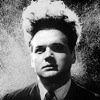Home » Jazz Articles » Genius Guide to Jazz » High and Outside
High and Outside
...his body of work has quietly grown as impressive as that of any former infant baseball prodigy schooled by animatronic bears in the Jazz world today.
Pay attention, kids, all this will be on the test.
What does any of this have to do with pianist Bill Carrothers, you ask? Well, for one, Shine Ball is the title of his latest CD. Secondly, like Admiral Ricci and me, Carrothers is an avid baseball fan. And third, it's my column and I can do whatever the hell I want.
Carrothers was born in 1964 and was immediately signed by the hapless New York Mets to replace "Marvelous Marv Throneberry, because even a newborn infant was an improvement at first base. He was released midway through the season for his light hitting, due mostly to his yet-undeveloped basic motor skills, and was picked up by the Washington Senators where he led the American League in walks (or would have, had he actually been able to walk) with his 4 x3½ strike zone.
Turning down offers to play in Mexico and Japan to concentrate on his toilet training, Bill also found himself inexplicably drawn to the piano. Entranced by the delightful noises it made, and relieved that it didn't throw 98 mph fastballs at his head, Bill found his calling and decided to devote the rest of his life to pressing black-and-white keys on a box full of wires which is nowhere near as boring as it sounds.
So then.
Carrothers grew up outside of Minneapolis, after the family left the city on vacation and were not able to return because they forgot to get their hands stamped. Bill's father, a Navy veteran and professional airline pilot, was a proud man who refused to pay the cover charge again. The family never forgot the slight, and many blame the "Carrothers Curse for the fact that the Minnesota Vikings are 0-4 in Super Bowls. But the Minnesota Twins are 2-1 in the World Series, so make of that what you will.
Growing up in a musical home, with animatronic bears that played Dixieland on command, Bill developed an early appreciation for jazz. This was nurtured by his parents, who did everything in their power to encourage his love of Our Music from piano lessons to casting Gerry Mulligan in a recurring role on the family sitcom Carrotherwise as baritone sax-wielding Lutheran minister Rev. Karlson.
As Bill grew up, he found additional direction both in a local jazzman who took him under his wing (he was one of the fabled Winged Pianists of the North), and an exceptionally good high school jazz program at Bill Evans High, home of the Fighting Horned Rims.
After high school, Bill decided to pursue a musical education at North Texas State University. He left after only one year because: A) The school had no baseball team, and B) Texas climate to a native Minnesotan was like riding a tricycle through Hell while wearing burlap underwear.
Returning to his home state, Bill decided to learn jazz the same way so many greats had in the past; from the animatronic bears that once swung in his living room to the tune of "Struttin' With Some Barbecue. Though the trio by this time had a steady gig at a particularly hip Chuck E. Cheese (where the E stood for Easy, baby), Bill was able to set in and hone his chops until finally having enough confidence in his abilities to start gigging with some of the big names that came through town (Billy Higgins, James Moody). Even as he ascended the ranks of professional musicians, Bill never forgot the valuable lessons the bears taught him; and to this day, has never lost his fondness for mediocre pizza and Whack-A-Mole.
Moving forward.
As Bill gained in skill and stature, the inevitable lure of the big city drew him back to New York where the former Met was welcomed with open indifference. After five years, he finally had to admit that Gotham just wasn't his scene. The breaking point finally came after learning the hard way that "Whatta YOU lookin' at? is largely a rhetorical question.
Back once again in his familiar environs, Bill was able to concentrate fully on his music and find an audience. Europe, particularly, offered Bill a willing ear. The French surrendered immediately to his mastery (and his vaguely Germanic features), awarding him the prestigious Diapason d'Or de l'année and "2,400,000 ($246.75) cash in return for his promise not to ruthlessly enslave them. The Germans awarded him their coveted Schallplatten Preis, which came with a liter mug of Dinkelacker and a side of weisswurst.
Settling in to a life in jazz on Michigan's Upper Peninsula outside of the traditional centers of the art, much like Your Own Personal Genius here in the Blue Ridge Mountains, Bill has developed both as a leader and a solo performer. From his more traditional After Hours and Duets with Bill Stewart, to his unique explorations of Americana on Armistice 1918 and Civil War Diaries, his body of work has quietly grown as impressive as that of any former infant baseball prodigy schooled by animatronic bears in the jazz world today.
Till next month, kids, exit to your right and enjoy the rest of AAJ.
The Genius Guide also recommends:
Carrotherwise Complete 1st Season DVD Featuring outtakes, director's commentary, and the rarely-seen pilot "It's a Boy, Mrs. Carrothers.
Shine Ball Bill's latest release on Bridge Boy Music.
Whackin' at the Cheese The Animatronic Bears Trio with Hank Mobley.
< Previous
The Sweet Life: Brazilian Jazz
Next >
Charles Lloyd: Confluence
Comments
Tags
For the Love of Jazz
 All About Jazz has been a pillar of jazz since 1995, championing it as an art form and, more importantly, supporting the musicians who create it. Our enduring commitment has made "AAJ" one of the most culturally important websites of its kind, read by hundreds of thousands of fans, musicians and industry figures every month.
All About Jazz has been a pillar of jazz since 1995, championing it as an art form and, more importantly, supporting the musicians who create it. Our enduring commitment has made "AAJ" one of the most culturally important websites of its kind, read by hundreds of thousands of fans, musicians and industry figures every month.























